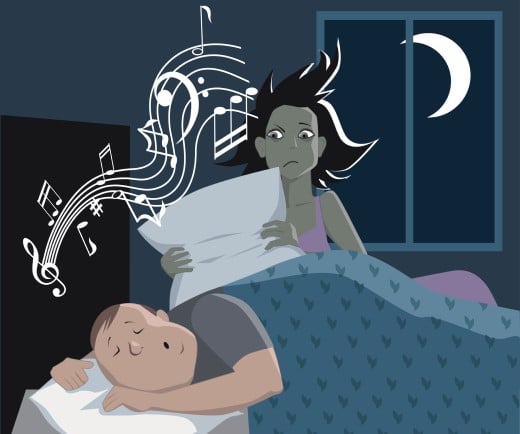
How to get more restful nights if you’re sleeping with someone with sleep apnea
By Jason Wooden, PhD | February 23, 2020
Sleeping with someone with sleep apnea can take a toll on you and a relationship. There’s too much at stake to wait on a bed mate to get their symptoms under control.
Your options to improve your sleep include better sleep hygiene, devices to block out snoring and other noise, stress management, and creative sleeping arrangements.

Help! I’m sleeping with someone with sleep apnea and it’s killing me!
So, your spouse has sleep apnea and it’s ruining your sleep?
Is it the awful snoring seen in over 70% of sleep apnea patients?
Or is it a noisy CPAP machine?
Regardless of the cause, it’s all the same – miserable nights and miserable days.
Currently, there are over 18 million people living with sleep apnea in the US alone, mostly in adults over 40.
With numbers like that, you’re probably not the only bed partner dealing with the scourge of sleep apnea. (Yes, it’s scourge…it can wreck lives.)
Check any online sleep forum and you’ll see pleas for help to get relief from a bed mate’s sleep apnea.
Maybe you’ve tried everything you can think of and you’re desperate for new ideas.
We’re going to take an honest look at what’s really at stake and what you can do about it.

What’s at stake if you’re sleeping with someone with sleep apnea
A lot has been written about the toll untreated sleep apnea can take on people.
They become sleep-deprived zombies stumbling day to day.
They don’t think too clearly and are unable to cope with everyday issues.
Over the long term, they’re more at risk for anxiety and depression, diabetes, heart disease, and dementia.
That’s a lot that can happen.
But what about the long-term toll on you if your sleep is interrupted night after night? Aren’t you at risk for some of the same things?
And, let’s not forget the toll this can take on a relationship.
It can add a ton of stress and chip away at the strongest of relationships.
Physical intimacy takes a back seat due to low energy. Emotional intimacy can suffer due to poor communication, irritation, anger, and stress.
And none of this is good if you have kids.
Would you believe that snoring, the most common sleep apnea symptom, has been estimated to be the third most common cause of divorce in the US and Great Britain?
It’s bad enough with one sleep-deprived person. With two, you’re really in dangerous waters and rolling the dice.
So, if you’re sleeping with someone with sleep apnea, there’s a lot at stake for you, your relationship, and your family.

If someone’s sleep apnea is ruining your sleep, you can’t wait on them to get it under control
Okay, it goes without saying that if your spouse’s sleep apnea was under control, it wouldn’t be keeping you from sleeping.
Unfortunately, too many people are either undiagnosed or don’t take their symptoms seriously.
And some diagnosed individuals have a hard time finding a treatment that works for them that they’ll consistently use night after night. (Would believe many patients give up on CPAP within the first year of treatment?)
Your spouse’s recovery from sleep apnea is really out of your control and you really can’t afford to wait on it.
It’s just too costly and could be a long wait.
That means you have to do whatever you can to start getting better sleep right now.

What to do to keep a bedmate’s sleep apnea from ruining your sleep
We’ve talked about the things out of your control when you’re sleeping with someone with sleep apnea.
The good news is what you do for your own self-care is still in your control and there are definitely things for you to try.
First, make sure you’re practicing good sleep hygiene in order to give yourself the best chance for restful sleep every night.
These are the things you do during the day and at night that set the stage for quality sleep. If you ignore them, it can undercut the best of intentions.
Sleep hygiene tips
- Keep regular wake up and sleep times
- Avoid naps
- Exercise during the day
- Avoid large meals, alcohol, or stimulants such as caffeine before bedtime
- Avoid electronic screens when in bed
- Maintain a bedtime routine to wind down
- Keep your bedroom quiet, dark, and cool
Are you surfing the web or watching TV at night in bed? That bright light from electronics screens can throw off your natural sleep-wake cycle and make it harder to fall asleep.
Want to find out what you’re doing right and what else you can change? Go through this checklist.
The biggest complaints by far about people with sleep apnea is the snoring and the noise from a CPAP machine. Besides keeping you from falling asleep, it can keep you out of restful deep sleep even when you’re not awake.
Tossing and turning may also disturb a spouse’s sleep.
Here’s what you can do:

1) Try falling asleep before they do:
This works for some people, especially deep sleepers. If they get the jump on a snoring bed partner, it gives them a chance to fall asleep.
But what if you’re a light sleeper and the snoring is so loud it keeps waking you up?
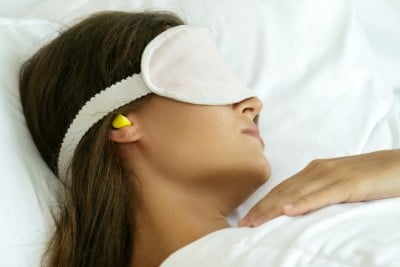
2) Try ear plugs:
Ear plugs are simple remedy to block out noise and there’s a lot you can choose from. You can find a couple options listed here.
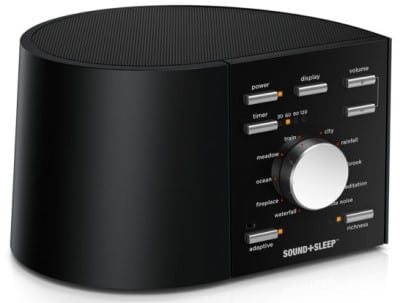
3) Try white noise:
Not comfortable with wearing ear plugs? White noise is an old fashion trick used to mask background sounds.
You can try a house fan or something more high-tech. I’ve listed some white noise machine options here.
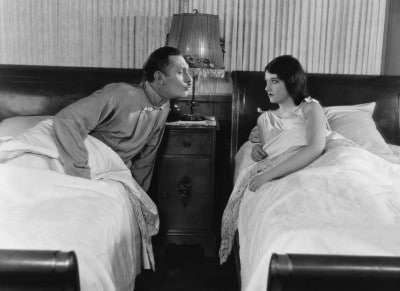
4) Try sleeping separately:
This would be my last choice, but it’s better than permanently ruining a relationship. I mentioned earlier how snoring is thought to be the third most common cause of divorce in the US and Great Britain.
So, perhaps it’s worth trying at least on a temporary basis.
Video: Couples Find Peace Through Sleep Divorce
Video: Sleeping separately saved relationship after husband tried every thing he could
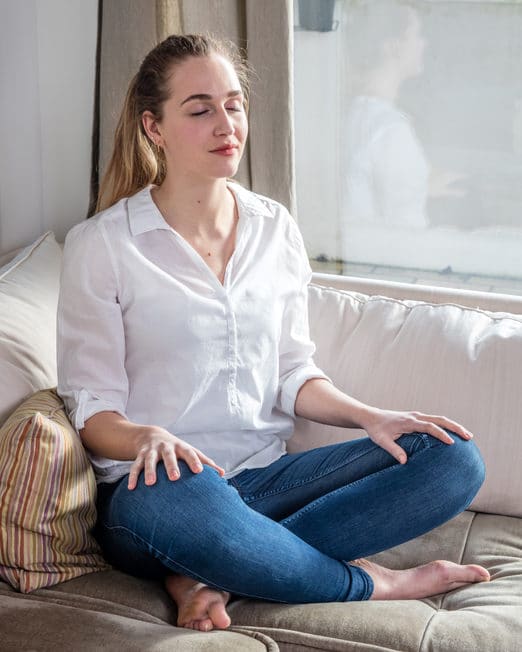
5) Stress management:
Did you know there’s a ping-pong effect between sleep and mental health. Stress, anxiety, and depression can all cause insomnia.
That makes it important to do what you can to keep from getting too stressed out. Physical activity and other practices such as yoga can help with stress.
To keep from getting overwhelmed, be realistic about your situation – some things will be in your control and some won’t. Keep things simple and take it one day at a time.
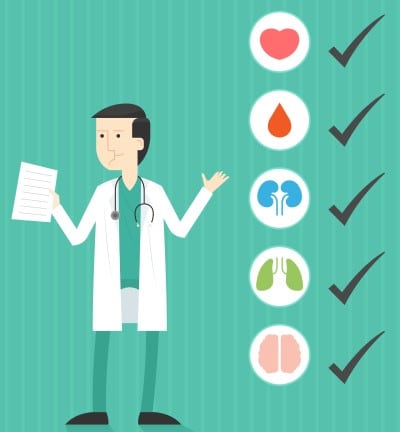
6) Check for other health issues:
Did you know that other things going on with your health can worsen your sleep troubles?
Asthma, allergies, acid reflux, kidney disease, cardiovascular disease, and chronic pain can keep you up at night. Prescription drugs, anxiety, and depression can also cause or worsen sleep issues.
A doctor can help you identify and work through any of these underlying issues that may be at play.

What you can do to support someone with sleep apnea
Focusing on your self-care will help you get better sleep and keep a bad situation from getting worse. You’ll have more energy to pick up the slack and help out around the house.
You’ll also be able to give more emotional support than if you were strung out from lack of sleep.
You’re probably wondering what else can be done to help your sleep apnea bedmate.
This can be tough if there’re in denial or are taking things for granted.
Everyone snores, right?
Or maybe, there’re just overwhelmed and are doing the best they can.
Here are some practical things to focus on:
Have they been diagnosed?
Sadly, most people with sleep apnea haven’t been diagnosed and are living with the consequences. If they haven’t already, encourage them to go in and see a doctor.
Today sleep apnea is a treatable condition. Many people who start CPAP, the most effective sleep apnea treatment, are amazed by the over night difference when they wake up.
So, there is hope that they can get their symptoms under control.
Have they given up on CPAP?
If they’ve tried CPAP and quit, they’re not alone. Some people have a hard time with the mask and blowing air.
The good news is that there are now plenty of alternatives they can try – smaller less obtrusive masks, oral appliances, and new innovative therapies that don’t involve a mask or blowing air.
Is it money?
If you don’t have medical insurance and you’re strapped for cash, you may feel stuck. Guess what, you still have options.
There are now lower cost ways online to get diagnosed and treated. In some cases, you may be able to get a free sleep study done while participating in a clinical study.
What to remember if you’re sleeping with someone with sleep apnea:
- You’re not alone, many people deal with this issue
- You can’t wait on them to get their sleep apnea under control
- There’re practical things you can do to improve your sleep
More resources:
Sleep apnea help:
Apnea Board (online forum)
Sleep Apnea online support group (supportgroups.com)
More sleep apnea forums and resources
Relationship help:
Relationship online support group (supportgroups.com)
Maintaining your health while a spouse is ill (wikiHow)
Sources:
1. Does Snoring Intensity Correlate with the Severity of Obstructive Sleep Apnea? J Clin Sleep Med. 2010 Oct 15; 6(5): 475–478.
2. “Sleep Apnea”, National Sleep Foundation website
3. “Is Your Intimate Relationship Suffering Due to Untreated Sleep Apnea?”, American Sleep Apnea Association website
4. Long-term compliance with continuous positive airway pressure in patients with obstructive sleep apnea,
Can Respir J. 2008 Oct; 15(7): 365–369.
Connect with us:
About Us
Better Sleep Simplified® was founded as a place for you to get clear and well-researched information.
Our goal is to make sure you know about your options so that you take action sooner rather than later.
Check us out on YouTube:
Watch and Learn
Helpful sleep tips, interesting sleep facts and statistics you want to know about
Affiliate Disclosure
This site is a participant in the Amazon Services LLC Associates Program and other affiliate advertising programs designed to provide a means for sites to earn advertising fees by advertising and linking to them.
Important: BetterSleepSimplified.com is for informational purposes only and is not intended or implied to be a substitute for professional medical advice, diagnosis, or treatment. Always consult a physician for sleep and health concerns. See additional information.
